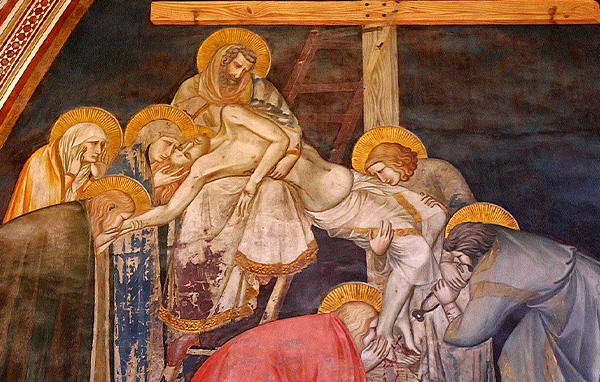16 Feb The Ludicrous Cross and Why we Surrender our Lives – Fifth Sunday after the Epiphany Febuary 5, 2023
Preacher: Rev. Stephen McPeek

Today is a very special and important day. It is the day when Daniel Wheeler will be baptized and initiated into the covenantal love of God and God’s people. Not only is Daniel being baptized, but all of us here present who are willing, will stand and renew our baptismal covenant, and we will renew the promises we made, or were made for us, when we were baptized.
This is not a cultural activity but rather a serious ritual that we consider one of the two sacraments in our church, a sacrament being an outer and visible sign of an inner and spiritual grace. In pouring water on Danny’s head in the name of the Father, and the Son, and the Holy Spirit, and anointing him with holy oil, a covenant is made and sealed that initiates him into the death and resurrection of Jesus. When I make the sign of the cross with oil eon Danny’s forehead, I say the words, “You are sealed by the Holy Spirit and MARKED AS CHRIST’S OWN FOREVER. These are powerful words with powerful implications. The union with God is solidified for the rest of his life. Danny official receives his title as member of God’s family, the church. And according to our faith, something significant changes in his life. In seminary, they called this change, “ontological change.” The doctrine of “ontological change” developed over a long period of time. It was previously known under various terms such as the “spiritual seal,” an “indelible mark,” a “character” and finally an “ontological change.” The original terms implied that something was added to the being (person). An “ontological change” implies that it is the same being to which there is a total change that takes place.
When you experienced an “ontological change”, while it is still you, you are no longer the same. I struggled with the concept of ontological change which is said to also happen at an ordination of a priest. I prostrated on the cold stone floor of the Anglican/Episcopal Church of St. Augustine in Wiesbaden, to surrender to God and commit my life to a life of service as a priest, and when I got up off of the floor, I knew something had happened and that this change was a forever thing.
Baptism is not something an institution thought up, rather is something that was commanded by Jesus and has been happening since then. Jesus said to his first friends, and by extension to us, that we should, “Go and make disciples of all nations, baptizing them in the name of the Father and of the Son and of the Holy Spirit, teaching them to observe all that I have commanded you. And behold, I am with you always, to the end of the age (Matthew 28:18-20).” Baptism follows faith. When the heart of a person is touched by God, and the eyes of a person are open to see the cross of Christ and the sacrificial love that Jesus demonstrated by his death the cross, we begin to believe.
In baptism, we are saying that we want to walk the same path as Jesus. We want to love God and be loved by God intimately, we want to live like Jesus, we want to serve those who are in the most need. In this moment, we surrender the leadership of our lives and begin to follow the loving and reliable guidance of God.
When a child is baptized, the parents and godparents make the promises for the child and together, we commit to help raise the child in the ways of God.
Two of the challenging things we commit to and promise are:
- To put our WHOLE trust in Jesus’ grace and love
- To follow and obey Jesus as our Lord.
In our modern world, the concept of obedience does not sit well with most people. I suggest it was exactly the same in the ancient world. Humans would prefer to be autonomous and subject to themselves, if at all possible. But in these words, we are promising to follow and obey. This is only possible if we have surrendered our lives to God based on the knowledge that God is good, that God loves and favors us, and that God is trustworthy.
The Epistle reading from Paul strongly underscores how difficult it is to understand our Christian faith that is based on something so ludicrous as the cross as a sign of love. And yet, we have been touched and changed by it, and because of it, we continue through the generations to share this message with others.
The two questions in the baptismal covenant that I have come to love the most are:
- Will you seek and serve Christ in all persons, loving your neighbor as yourself?
- Will you strive for justice and peace among all people, and respect the dignity of every human being?
Our answer is:
“I will, with God’s help.”
This act of surrender and this sealing of a covenant between God and ourselves is what changes into salt and light, it enables us to live in a way that cares for those who are the weakest and who are on the fringes of society. I invite us now to accompany Daniel as this covenant is made on his behalf as we renew our own covenant with God.

